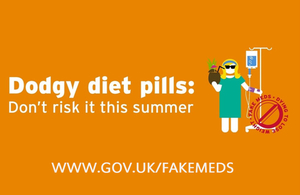Dodgy diet pills: Dying to lose weight?
MHRA launch FakeMeds campaign with warning on dodgy diet pills

Dodgy diet pills - don't risk it this summer
A campaign is being launched today aimed at young adults warning of the dangers of buying dodgy diet pills online.
FakeMeds aims to warn would-be slimmers against shelling out for dangerous or useless products sold by illegal online suppliers.
Thousands of pills and potions promising miracle results are bought over the summer months as holidaymakers look for shortcuts to beach-ready bodies – with women aged 18-30 most likely to buy.
After handing over bank details, many receive bottles of tablets packed with dangerous or useless ingredients. Nasty side effects can include heart attacks, strokes – and in extreme cases, death.
The frightening consequences of taking dodgy diet pills are set to play out onscreen this August, as Coronation Street’s Bethany Platt collapses in a bid to get slim quick.
The Medicines and Healthcare products Regulatory Agency (MHRA) has launched a campaign page with practical information on how to recognise legitimate online retailers of medicines and medical devices.
MHRA seized over 240,000 doses of unlicensed slimming pills in 2015, and closed down over 2,000 unauthorised online retailers. Research carried out by MHRA in 2016 showed that although shoppers believe themselves to be “internet-savvy”, 79% of the public are unaware of the issue of fake medical products.
MHRA Senior Policy Manager Lynda Scammell said: “The internet offers access to a vast number of websites offering products marketed as “slimming” or “diet” pills. Many make attractive claims and offer “quick-fix” solutions, but the only pounds you will lose will be from your bank balance.
“Many of these pills will not be licensed medicines. That means their contents are unknown and untested. Chances are they simply will not work, but they may contain dangerous ingredients. The consequences for your health can be devastating.
“The safest way to lose weight is to eat well and exercise. If you have serious concerns about your weight, you should consult your GP or another healthcare professional.
“Know what you’re buying – if you don’t, your weight could be the least of your worries!”
Visit www.gov.uk/fakemeds for tips on buying medicines safely online and how to avoid unscrupulous sites.
Ends
Background
-
FakeMeds campaign url: www.gov.uk/fakemeds. Follow #FakeMeds on Twitter.
-
The public is advised that they should take prescription-only medicines after an appropriate consultation with their GP. Only healthcare professionals can take into account risks and benefits associated with every medicine
-
To report a counterfeit medicine or device contact MHRA’s dedicated 24-hour hotline on 020 3080 6701, or email counterfeit@mhra.gsi.gov.uk, or write to: Counterfeits, The Intelligence Unit, MHRA, 151 Buckingham Palace Road, Victoria, London, SW1W 9SZ.
-
To report a suspected side effect from a fake medicine visit the Yellow Card Scheme website.
-
Further information about how MHRA tackles counterfeit medicines and devices can be found at the following MHRA website link
-
The Medicines and Healthcare products Regulatory Agency is responsible for protecting and improving the health of millions of people every day through the effective regulation of medicines and medical devices, underpinned by science and research. The agency consists of three centres: CPRD, NIBSC and MHRA.
Media enquiries
News centre
MHRA10 South Colonnade
London
E14 4PU
Email newscentre@mhra.gov.uk
Telephone (including out of hours): 020 3080 7651
Updates to this page
-
Updated campaign page url
-
First published.